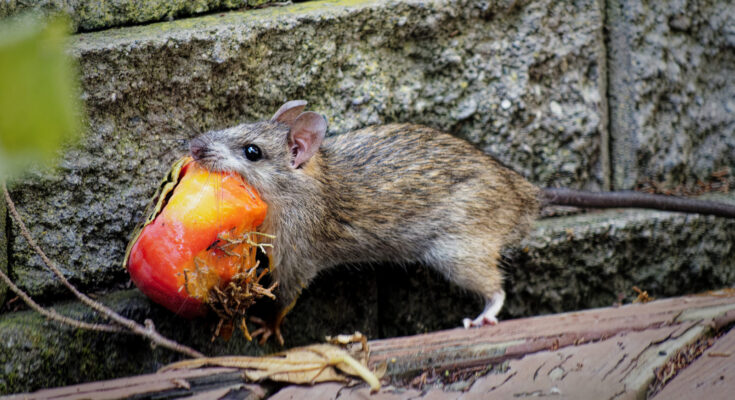Is Wolf Urine The Secret To A Pest-Free Home? What To Know Before You Try
Homeowners who enjoy gardening and decorating their home with beautiful plants have most likely dealt with pests. Although spreading coffee grounds around your garden is an easy repellent for insects, plant-eating animals can be a bit more tricky to combat. Pests such as mice, moles, rabbits, rats, squirrels, deer, and coyotes, can become a burden when they enter your space and enjoy their fill. While researching natural repellents, you’ll quickly find that predator urine has become a hot item on the market, more specifically, wolf urine.
Even though using the scent of a northern hemisphere apex predator as a repellent sounds like an obvious choice, it’s important to understand the how and why of what makes this work, and, more importantly, understand what negatives come from using wolf urine to repel other animals. After all, a 2016 study found that predator odors can attract other predators. Regardless, we’ll demystify this trend of wolf urine as a pest-repellent and find a better understanding of whether this natural repellent is right for your home.
How wolf urine activates fear and avoidence behavior
While the idea of using wolf urine to scare away other animals is pretty straightforward, it’s a bit more complex when executed. Urine in nature is often used as a means of communication, marking territory, and establishing dominance. For instance, when a deer is grazing and catches the scent of a wolf, it triggers survival instincts, causing the deer to show fear and avoidance behavior, resulting in the deer staying away from that area.
The chemical compounds that trigger these physical or behavioral changes when smelled are called semiochemicals. You’ve probably heard of pheromones, semiochemicals that work between members of the same species. Semiochemicals that work between different species are called allelochemicals. When an allelochemical confers a benefit on the species that smells it, it’s called a kairomone. In the case of our garden pests, the benefit is not getting eaten by a wolf.
Although wolf urine is a great natural repellent for deterring pests, it can cause concern for attracting other wolves, particularly if they are already established in your area Before you decide to ring your garden with wolf urine, it’s best to research what type of wildlife lives in your area.
Marking your territory with wolf urine
Applying wolf urine to your property is a simple process. All you need to do is coat various areas around the property to mark your territory. Additionally, you can spray the urine right onto your plants as wolf urine is a natural substance that does not harm plant life, nor are there added chemicals. Alternatively, you can use scent tags and stakes if you prefer not to spray your garden and plants with the natural repellent.
Be sure to reapply the repellent in adjacent areas to keep the scent potent. Furthermore, your dogs and cats will be safe from it as well since the repellent is non-toxic, and at worst, they’ll be curious about the smell, but it’s not likely to cause any harm.
In the end, using predator pee as a repellent is a hotly contested topic amongst homeowners looking to banish the worst pests away from their property. However, wolf urine appears to be the closest to a cure-all compared to others, with a cautionary note to know the wildlife in your area. Aside from that, the only major downside is the strong smell of wolf pee.



